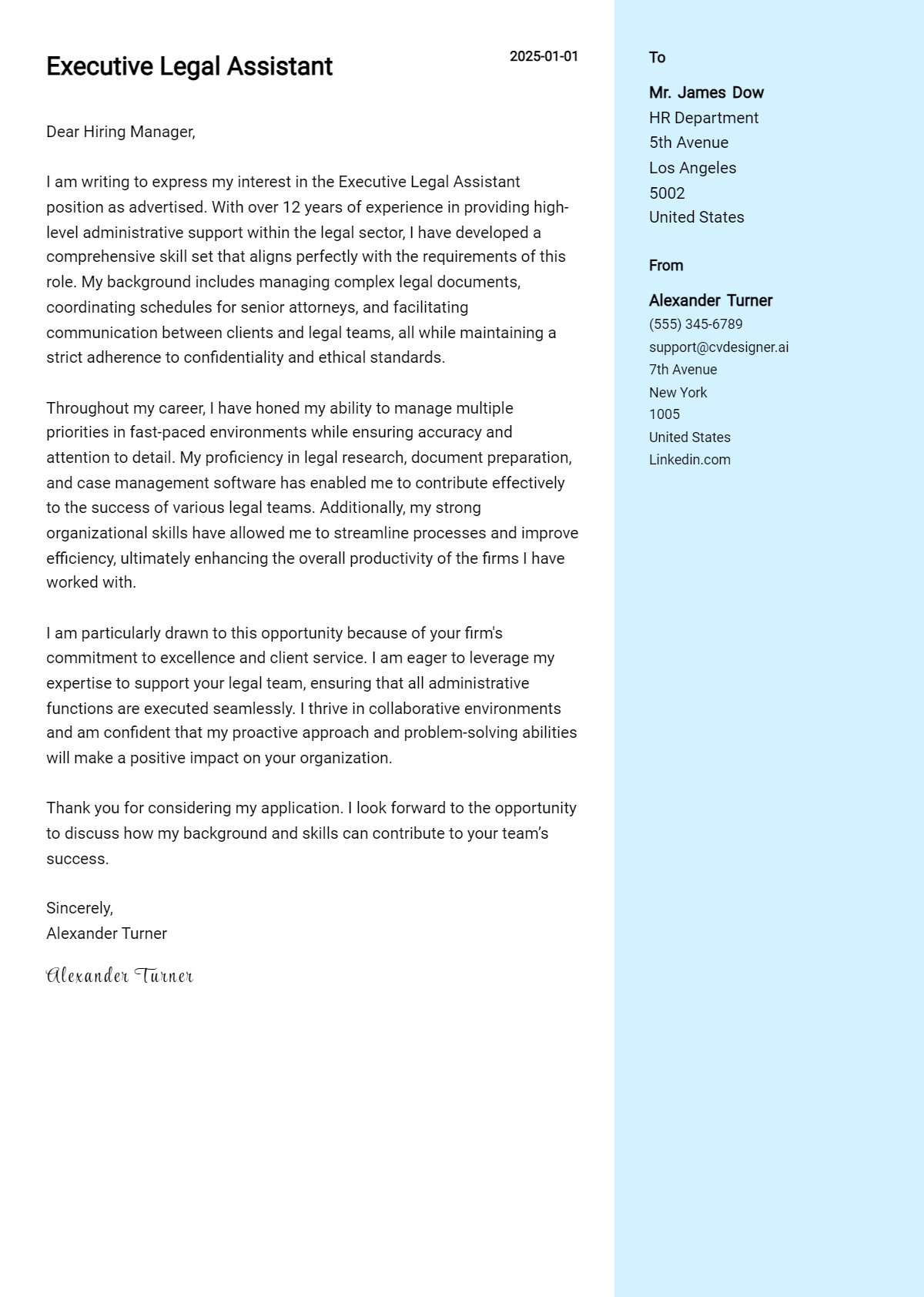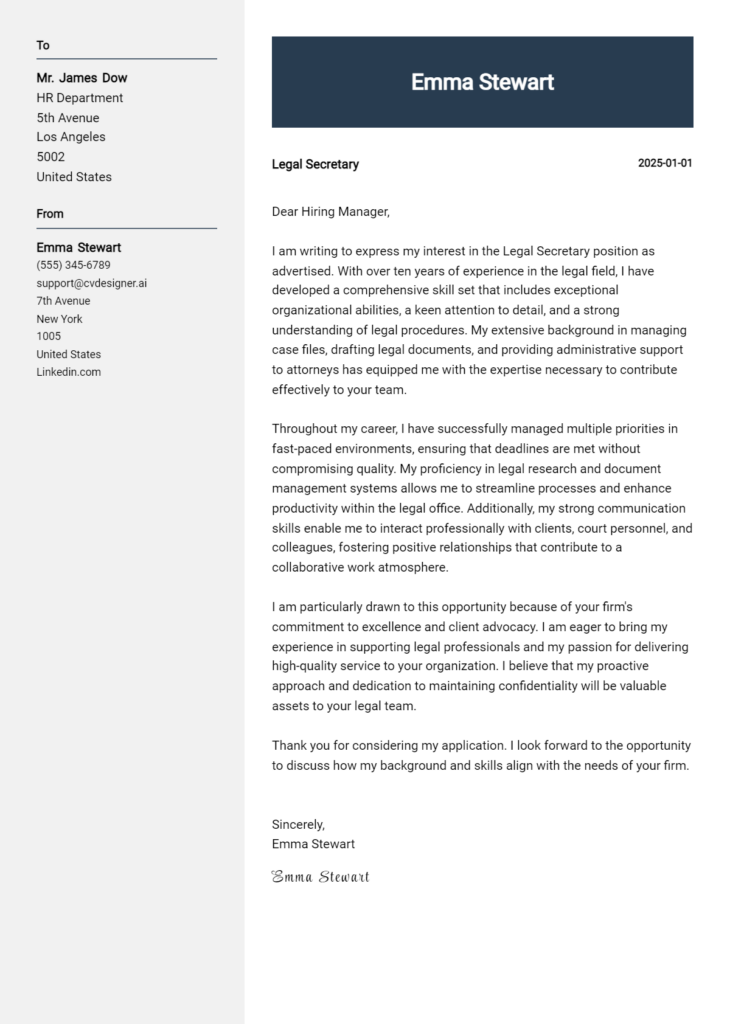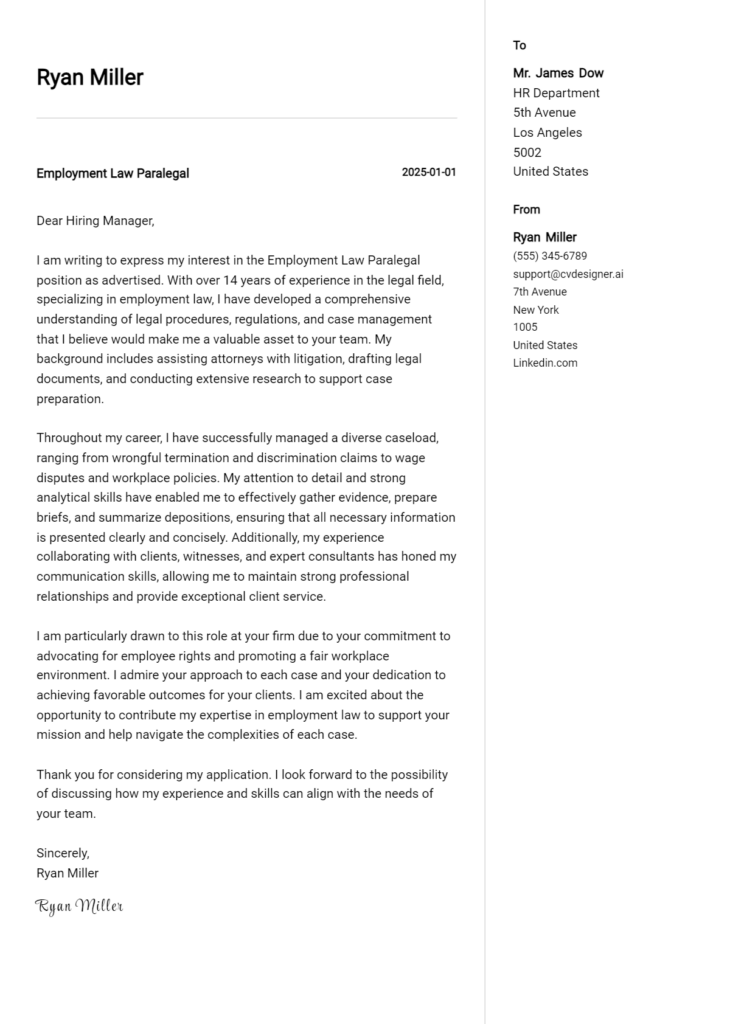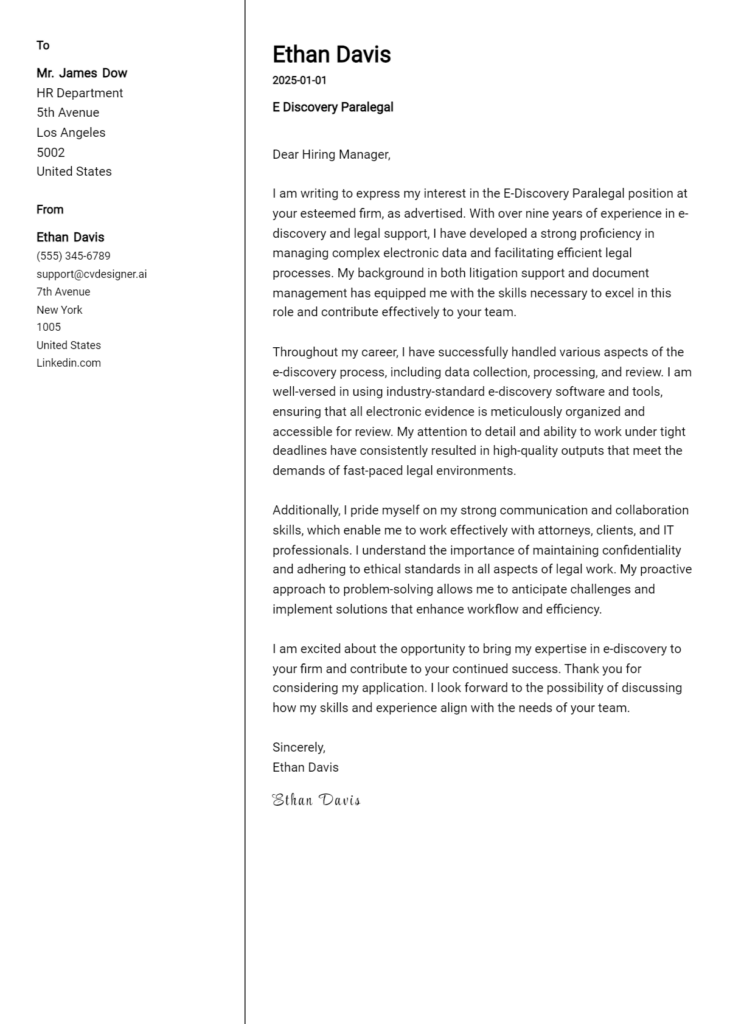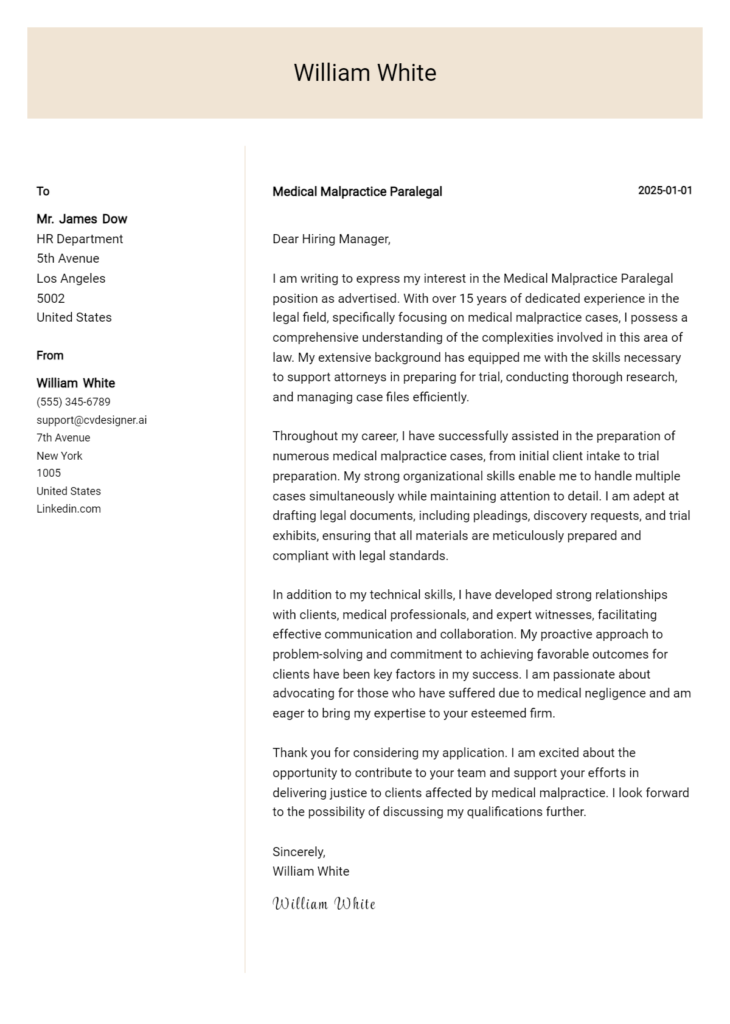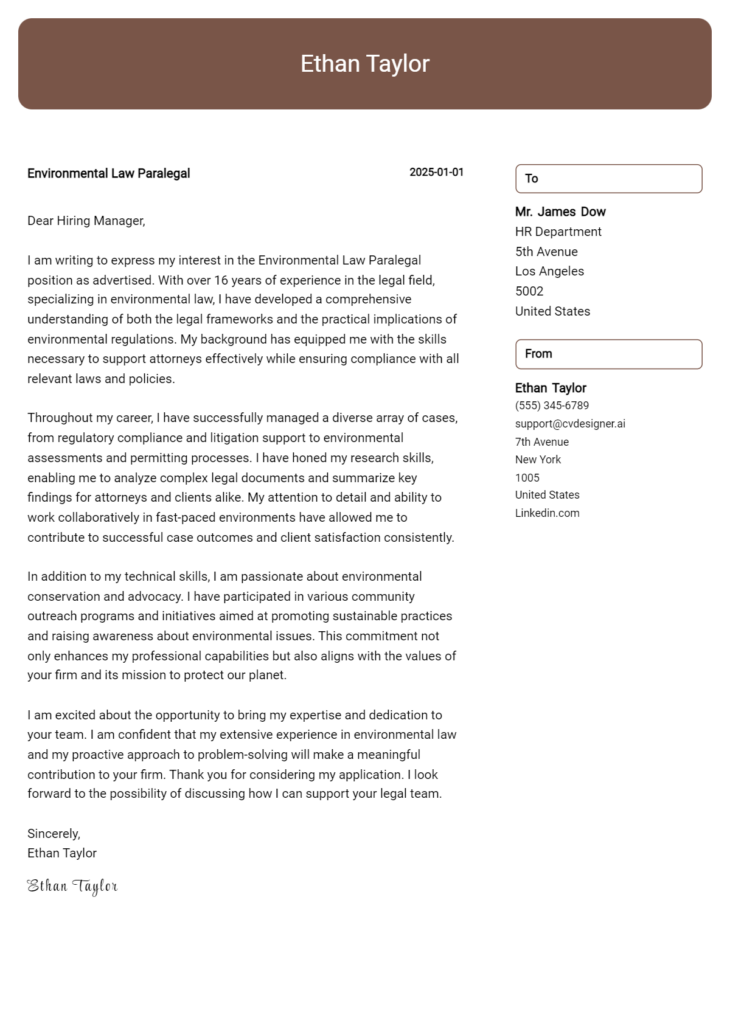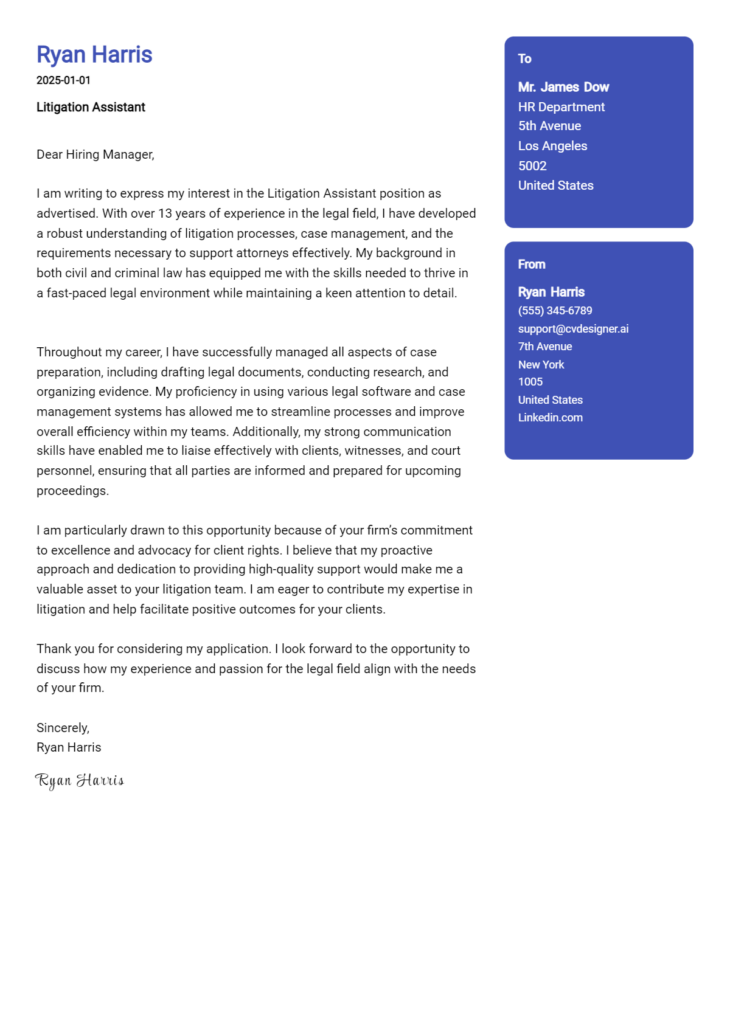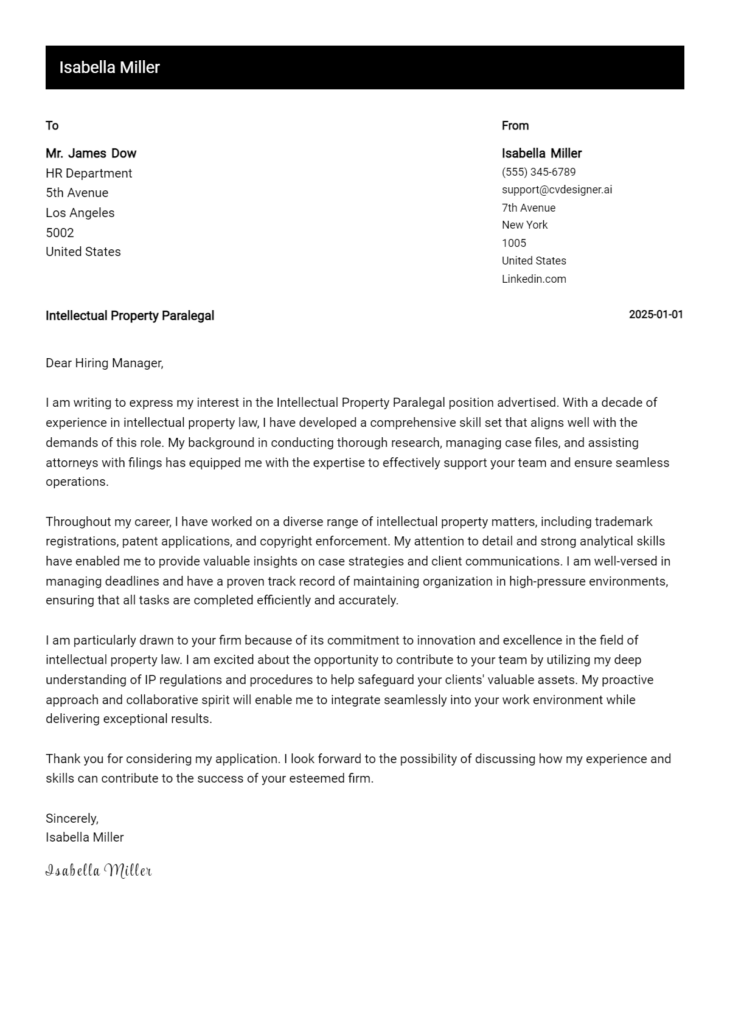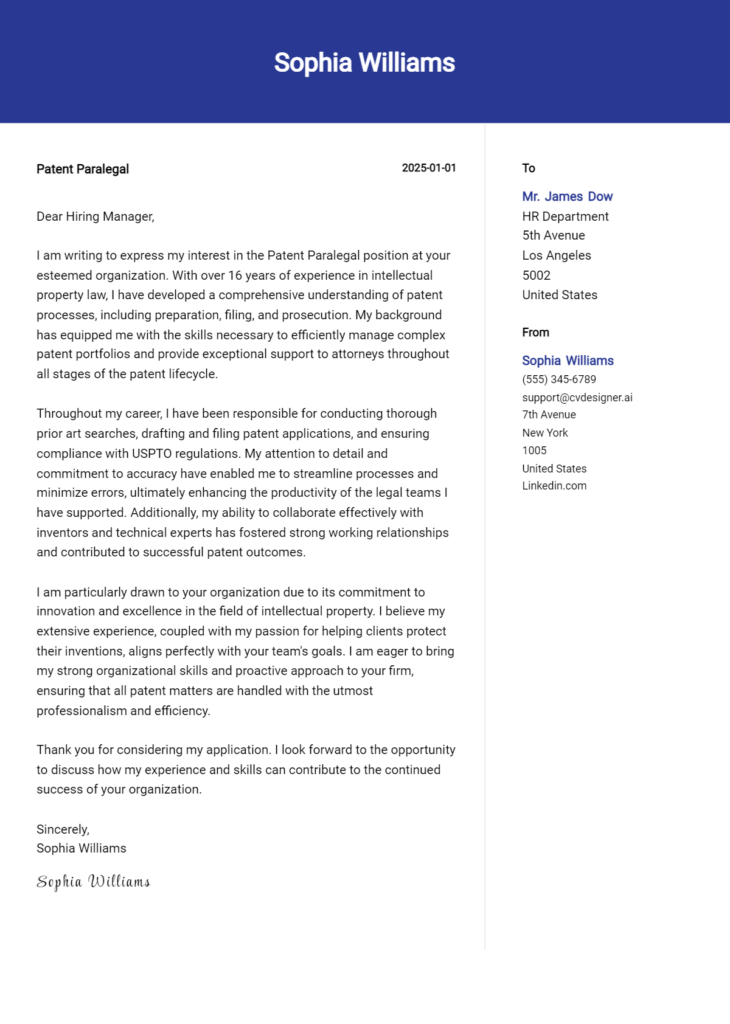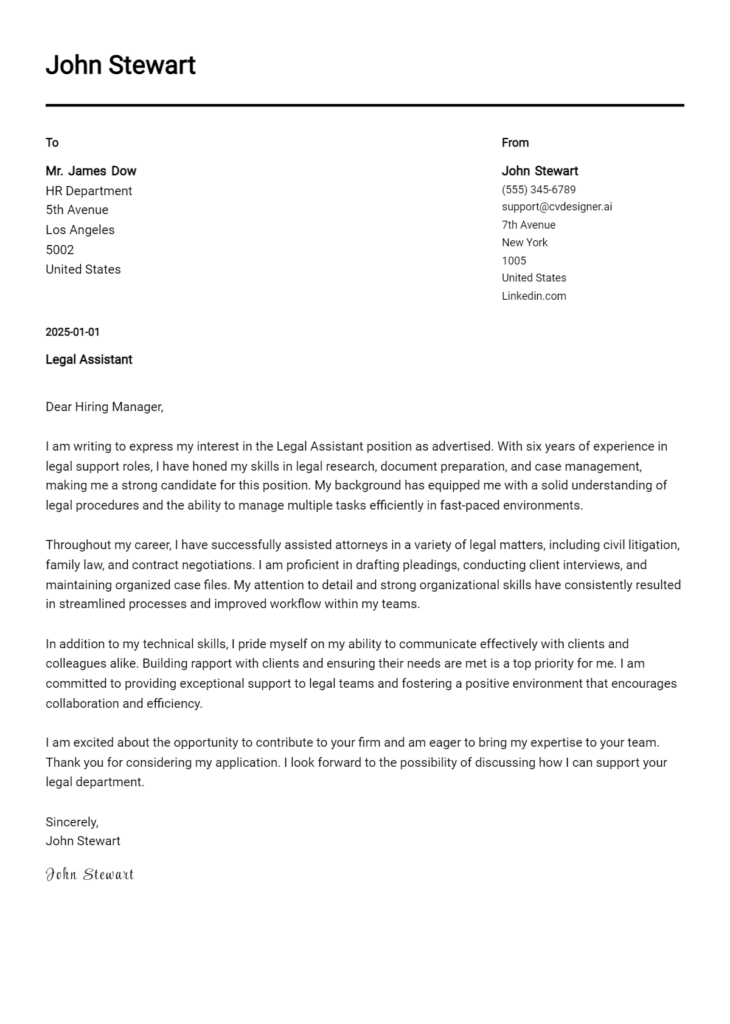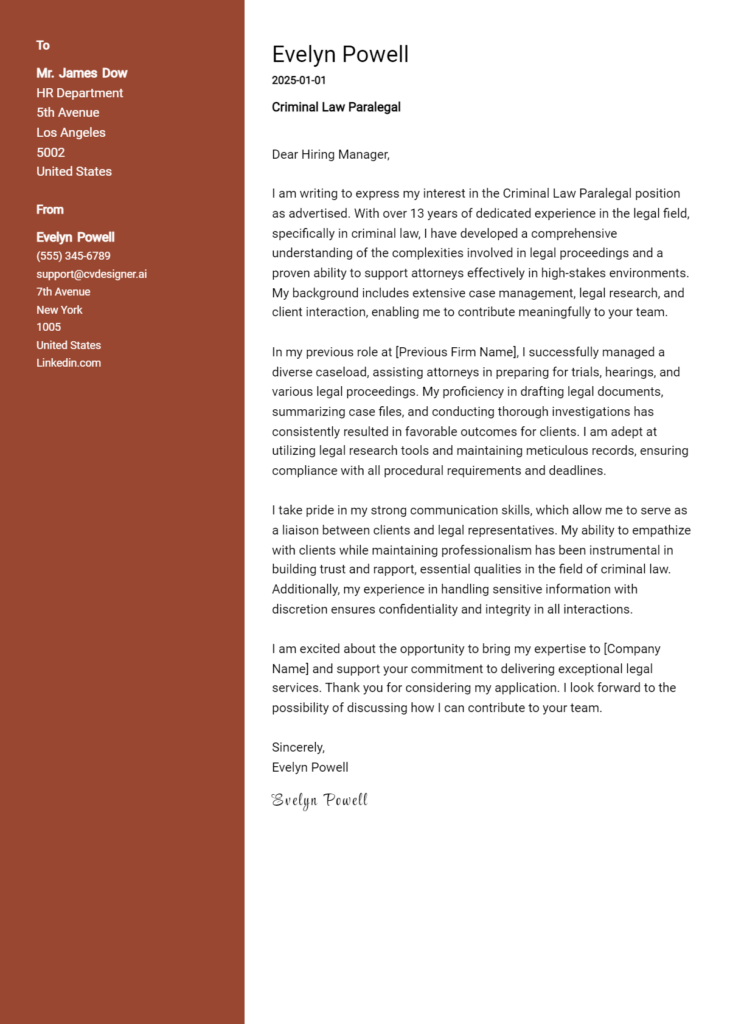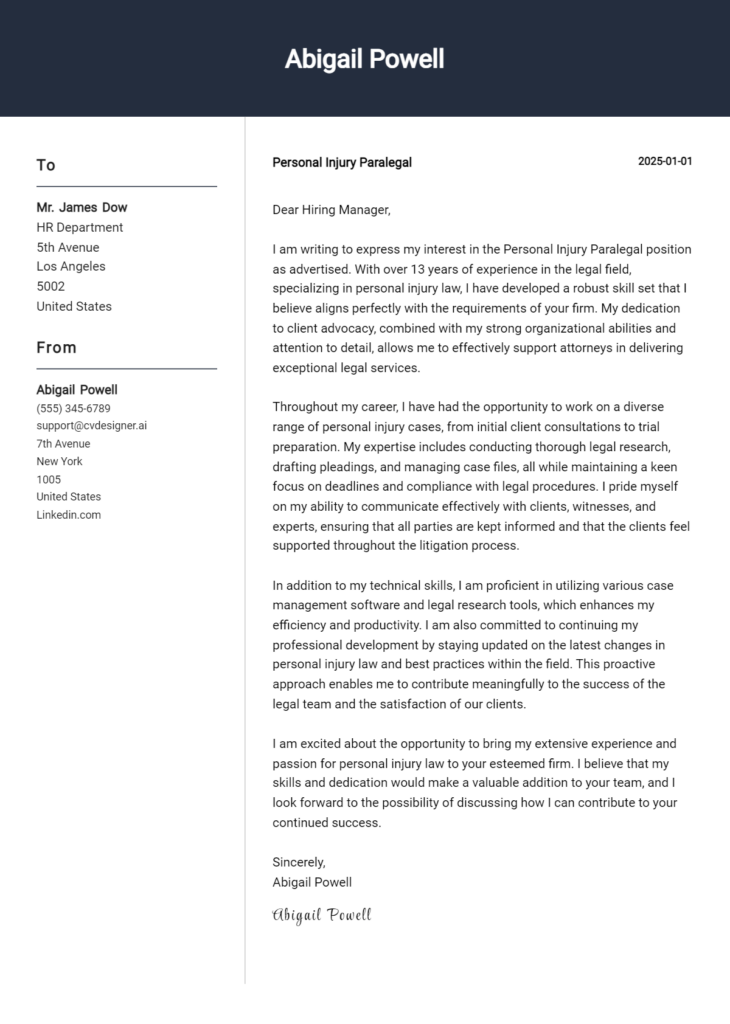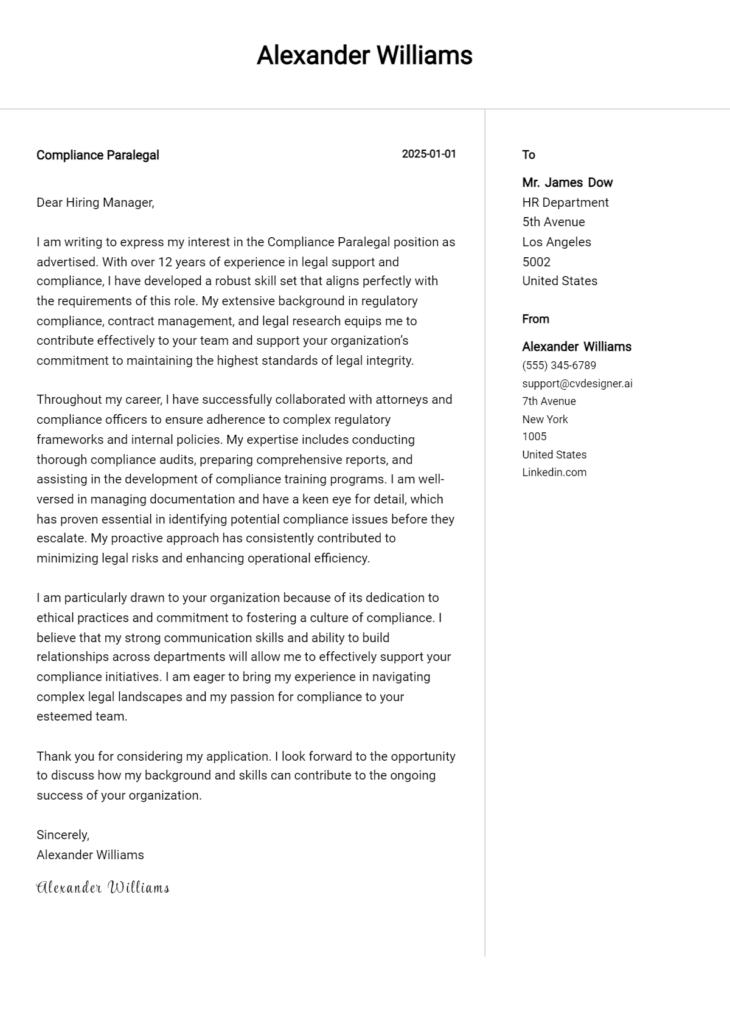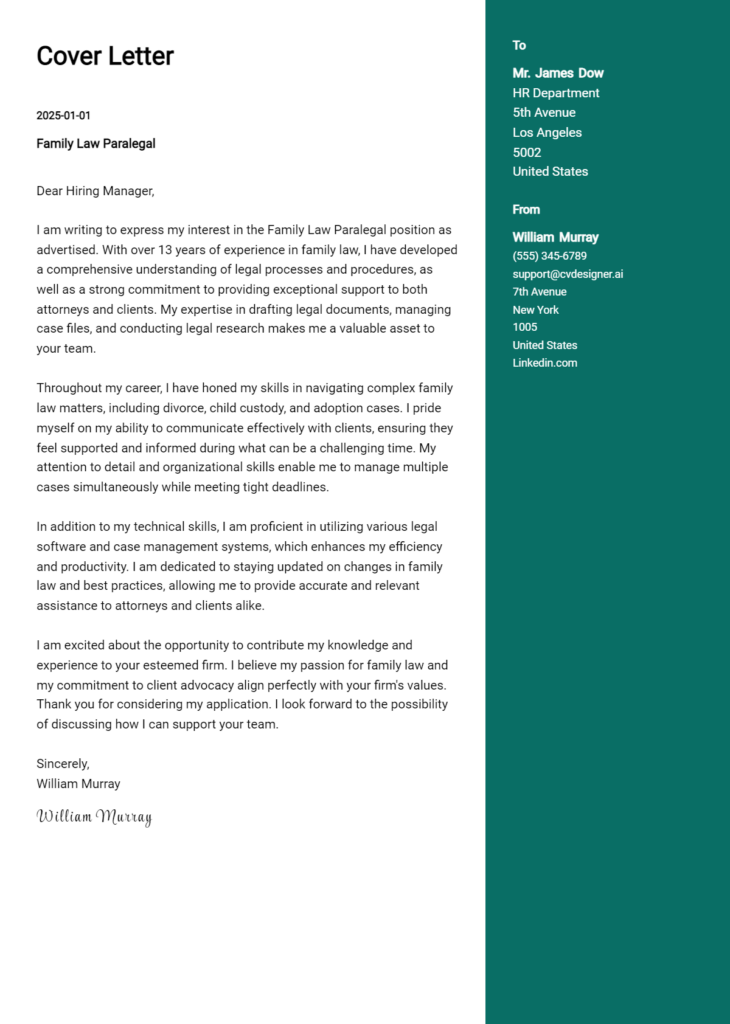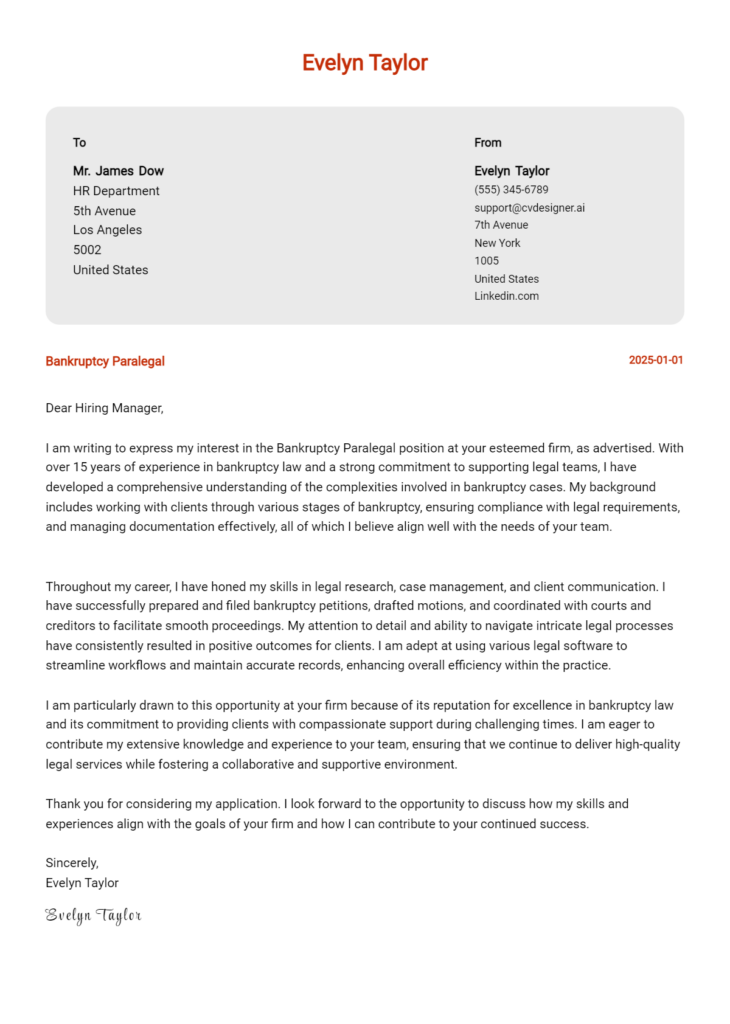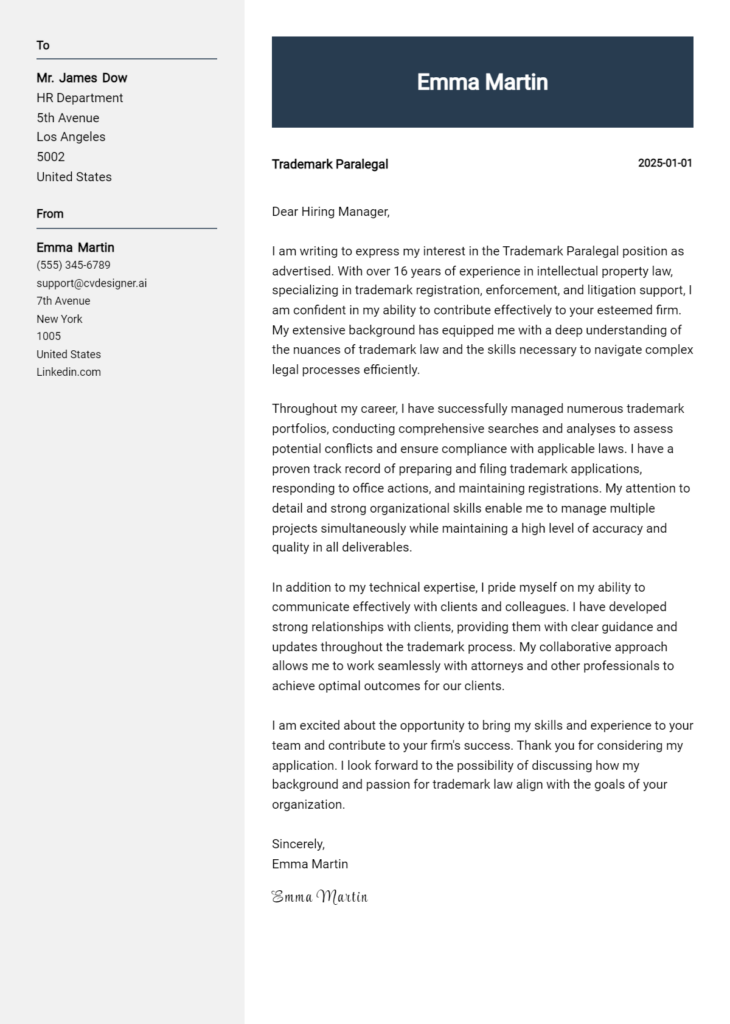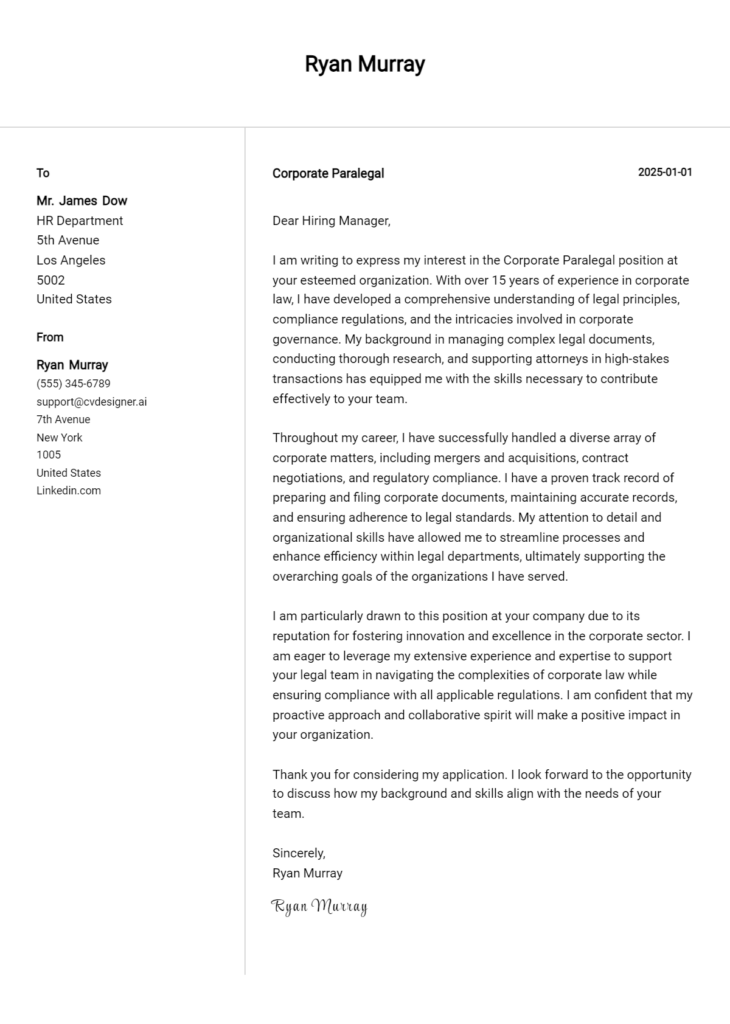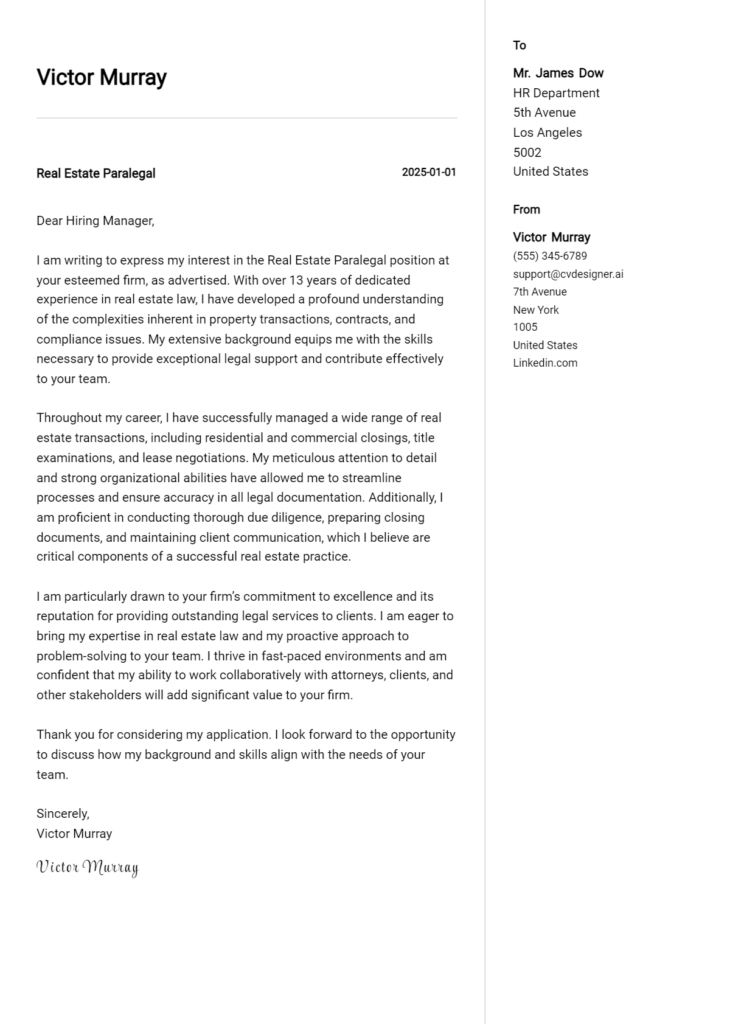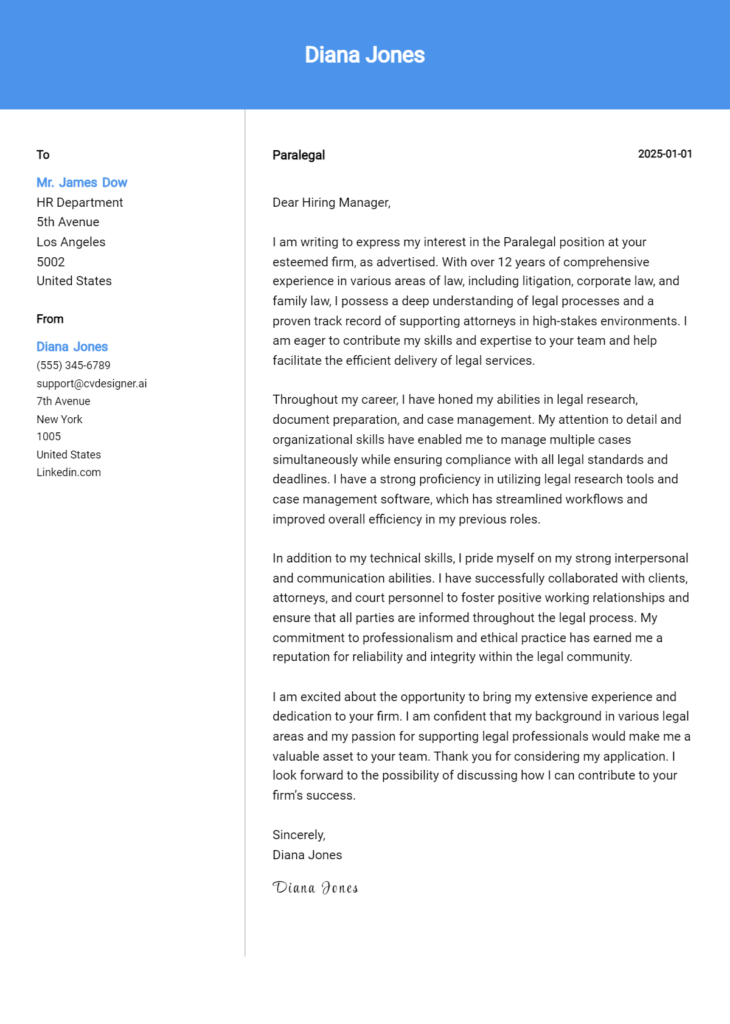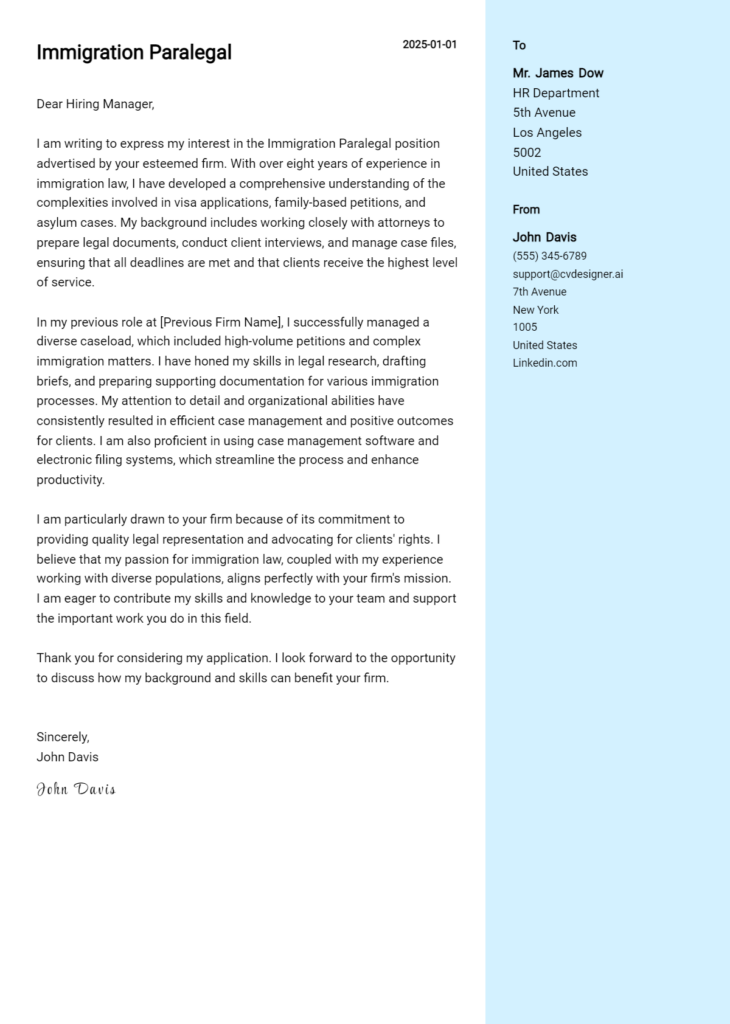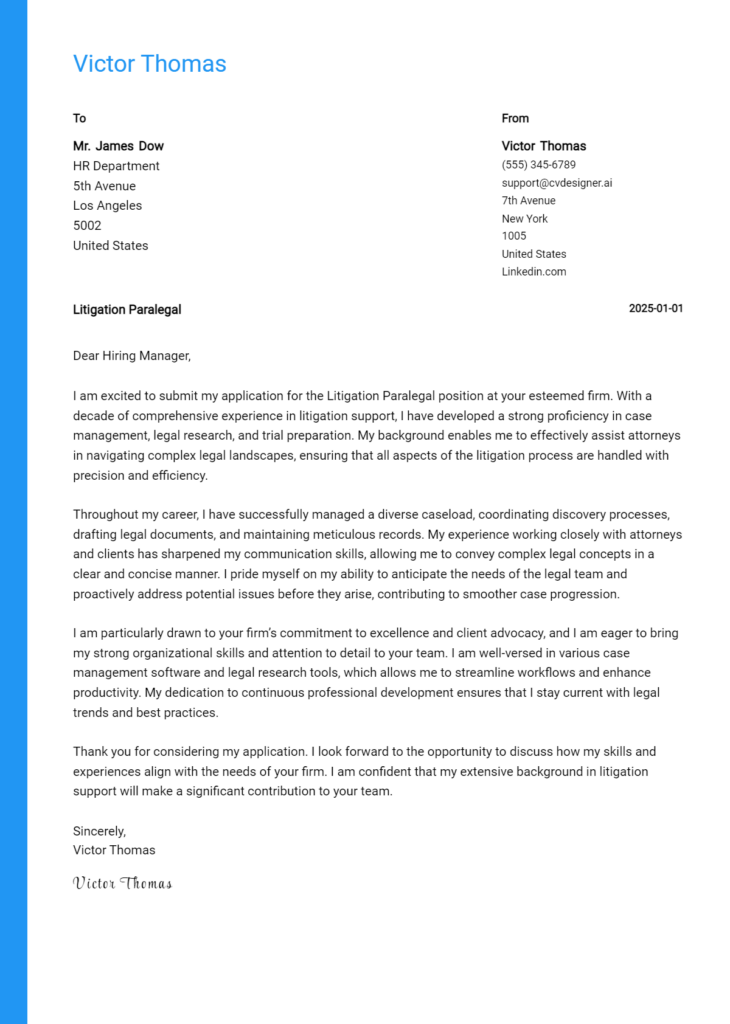Executive Legal Assistant Cover Letter Examples
Explore additional Executive Legal Assistant cover letter samples and guides and see what works for your level of experience or role.
How to Format an Executive Legal Assistant Cover Letter?
Crafting a well-structured cover letter is essential for an Executive Legal Assistant, as it not only showcases your qualifications but also reflects your professionalism and organizational skills. In the legal field, attention to detail and clear communication are paramount, making the format of your cover letter a critical element in capturing the hiring manager's interest. A polished cover letter can set you apart from other candidates, demonstrating your ability to manage complex tasks and support legal operations effectively.
In this guide, we'll delve into the key components of an effective Executive Legal Assistant cover letter, including:
- Cover Letter Header
- Cover Letter Greeting
- Cover Letter Introduction
- Cover Letter Body
- Cover Letter Closing
Each section is crucial in portraying your capabilities and commitment to the role. Let’s break down the components to help you create a compelling cover letter that makes a lasting impression.
Importance of the Cover Letter Header for an Executive Legal Assistant
The header of a cover letter is crucial as it sets the tone for the entire document and provides essential information in a clear and professional manner. For an Executive Legal Assistant position, the header should include your contact information, the date, and the recipient's details. This clarity ensures that the hiring manager can easily identify who you are and how to reach you, establishing a professional first impression. A well-organized header reflects your attention to detail, which is a vital skill in the legal field.
Strong Example
Jane Doe 123 Main Street City, State, Zip jane.doe@email.com (123) 456-7890 October 1, 2023 Mr. John Smith Hiring Manager XYZ Law Firm 456 Legal Ave City, State, Zip
Weak Example
jdoe@email.com October 1st, 2023 XYZ Law Firm City
The Importance of the Cover Letter Greeting for an Executive Legal Assistant
The greeting of a cover letter plays a crucial role in setting the tone for the entire document. A well-crafted greeting not only demonstrates professionalism but also adds a personal touch by directly addressing the hiring manager. This initial interaction can influence the reader's perception of your application and highlight your attention to detail, which is vital in the legal field. Avoiding generic greetings, such as "To Whom It May Concern," allows you to connect more authentically with the recipient. Taking the time to research the hiring manager's name can make your application stand out and reflects your genuine interest in the position.
Here are some examples of strong and weak greetings for an Executive Legal Assistant cover letter:
Strong Example
Dear Ms. Johnson,
Weak Example
To Whom It May Concern,
The Importance of a Well-Crafted Cover Letter Introduction for an Executive Legal Assistant
A compelling cover letter introduction is crucial for any Executive Legal Assistant applicant. This initial paragraph serves as the first impression to the hiring manager, making it essential to capture their attention right away. A strong introduction not only conveys the candidate's enthusiasm for the position but also succinctly highlights relevant skills and accomplishments that align with the job requirements. This sets the tone for the rest of the letter and can significantly influence the decision to consider the applicant further. Below are examples of both strong and weak cover letter introductions for an Executive Legal Assistant position.
Strong Example
Dear [Hiring Manager's Name], I am excited to apply for the Executive Legal Assistant position at [Company Name], where my extensive background in legal support and administrative management can contribute to your team’s success. With over five years of experience in fast-paced legal environments, I have honed my skills in document preparation, case management, and client communication, ensuring seamless operations and exceptional service. I am particularly drawn to this role at [Company Name] because of your commitment to excellence and innovation in the legal field, and I am eager to bring my expertise in supporting high-level executives to your esteemed firm.
Weak Example
To Whom It May Concern, I am applying for the Executive Legal Assistant job. I have worked in law firms before but don’t remember much about what I did. I think I would be a good fit for the job because I need one and I can type well. I hope you consider my application.
Purpose of the Cover Letter Body for an Executive Legal Assistant
The cover letter body serves as a critical component in showcasing an Executive Legal Assistant's skills, experiences, and overall value to the potential employer. This section allows candidates to articulate their qualifications, highlight specific projects or accomplishments that align with the job description, and convey their understanding of the legal landscape. By detailing relevant experiences such as managing complex case files, coordinating with legal teams, or facilitating communication between clients and attorneys, candidates can effectively demonstrate their ability to contribute to the firm's success. A well-crafted cover letter body not only outlines the candidate's legal expertise but also reflects their professionalism and enthusiasm for the role.
Strong Example
Dear [Hiring Manager's Name], I am writing to express my interest in the Executive Legal Assistant position at [Company Name]. With over five years of experience in a fast-paced legal environment, I have successfully managed multiple case files, ensuring timely and accurate documentation. For instance, I played a key role in a high-stakes litigation project where I organized discovery materials that led to a favorable verdict for our client. My attention to detail and strong organizational skills have allowed me to streamline processes, reducing filing errors by 30%. I am confident that my proactive approach and commitment to excellence will be an asset to your legal team. Sincerely, [Your Name]
Weak Example
Dear [Hiring Manager's Name], I am interested in the Executive Legal Assistant role at [Company Name]. I have worked in legal offices before and have some experience with paperwork. I think I would be a good fit because I can type fast and I know how to use a computer. I haven’t worked on any big projects, but I am willing to learn. I hope to hear from you soon. Best, [Your Name]
Importance of the Cover Letter Closing for an Executive Legal Assistant
The closing paragraph of a cover letter is crucial as it serves to summarize your qualifications, reiterate your interest in the position, and encourage the hiring manager to take the next steps, such as reviewing your resume or scheduling an interview. A strong closing can leave a lasting impression, showcasing your professionalism and enthusiasm for the role. In contrast, a weak closing may fail to convey your eagerness or the value you bring to the position.
Strong Example
Thank you for considering my application for the Executive Legal Assistant position. With my extensive experience in legal administration and my commitment to providing exceptional support, I am excited about the opportunity to contribute to your team at [Company Name]. I look forward to the possibility of discussing how my skills align with your needs. Please feel free to contact me at your earliest convenience to schedule an interview. I have attached my resume for your review and am eager to provide any additional information you may require.
Weak Example
Thanks for reading my letter. I think I’d be a good fit for the job. If you want to talk more, just let me know. I guess you can look at my resume or something.
These tips will guide candidates in crafting an effective cover letter for the Executive Legal Assistant position, emphasizing the importance of showcasing technical skills, problem-solving abilities, knowledge of the Software Development Life Cycle (SDLC), teamwork, and a passion for continuous learning. A well-structured cover letter can make a strong impression on potential employers, highlighting your qualifications and fit for the role.
Tips for Writing a Compelling Cover Letter
Highlight Technical Skills
Begin your cover letter by explicitly mentioning your technical skills relevant to the legal field, such as proficiency in legal research databases, document management systems, and Microsoft Office Suite. Use examples to demonstrate how these skills have helped you in previous roles, ensuring that you align them with the requirements of the Executive Legal Assistant position.Showcase Problem-Solving Abilities
Legal environments often present complex challenges. Use your cover letter to illustrate specific instances where you effectively identified problems and implemented solutions. This could involve streamlining processes, improving communication within a team, or successfully managing tight deadlines. Employers value candidates who can think critically and act decisively.Demonstrate SDLC Knowledge
If applicable, mention your understanding of the Software Development Life Cycle (SDLC) and how it relates to the legal technology used in law firms. Explain how your familiarity with project management methodologies can benefit the organization, especially when coordinating with IT teams or managing legal tech projects.Emphasize Teamwork and Collaboration
The role of an Executive Legal Assistant often requires working closely with attorneys, paralegals, and other staff members. Highlight your experience in collaborative environments, detailing how you contribute to team success. Share anecdotes that reflect your ability to build relationships and support team objectives, which is crucial for maintaining a harmonious workplace.Express Passion for Continuous Learning
The legal field is constantly evolving, and demonstrating a commitment to continuous learning can set you apart. Mention relevant courses, certifications, or workshops you have attended, and express your enthusiasm for keeping up with industry trends and legal advancements. This showcases your proactive approach to personal development and your dedication to providing high-quality support.
By following these tips, you can craft a compelling cover letter that showcases your unique qualifications for the Executive Legal Assistant position. For additional guidance, consider exploring cover letter templates or utilizing a cover letter builder to help structure your application effectively.
Common Mistakes to Avoid in an Executive Legal Assistant Cover Letter
Avoiding common mistakes in a cover letter is crucial for standing out in the competitive field of executive legal assistance. A well-crafted cover letter can make a significant difference in securing an interview. Here are some common pitfalls to watch out for, along with tips on how to avoid them:
Generic Greetings: Using "To Whom It May Concern" can appear impersonal. Always try to find the name of the hiring manager for a more personalized touch.
Lack of Specificity: Failing to tailor your cover letter to the specific job or firm can make it seem like you are mass mailing applications. Research the firm and mention specific reasons why you're interested in the position.
Typos and Grammatical Errors: Errors can reflect poorly on your attention to detail, a crucial skill for an executive legal assistant. Always proofread your letter and consider using tools to catch mistakes.
Repetition of the Resume: Your cover letter should complement your resume, not repeat it. Use this opportunity to highlight key achievements and explain how they relate to the position.
Ignoring the Format: A poorly formatted cover letter can be hard to read and unprofessional. Follow a clear cover letter format to ensure your information is well-organized.
Too Lengthy or Too Short: A cover letter should be concise yet informative. Aim for a length of about half a page to one full page. Avoid rambling while ensuring you cover essential points.
Neglecting to Include Call to Action: Failing to express enthusiasm for the position or to indicate your desire for an interview can leave a weak impression. End with a strong closing statement that invites further communication.
By avoiding these common mistakes, you can create a compelling cover letter that showcases your qualifications and enthusiasm for the executive legal assistant role. For inspiration, check out some cover letter examples to guide your writing process.
Cover Letter FAQs for Executive Legal Assistant
What should I include in my cover letter for an Executive Legal Assistant position?
In your cover letter, begin with a strong introduction that states your interest in the Executive Legal Assistant position. Highlight your relevant experience, such as previous roles in legal settings, your familiarity with legal terminology, and your organizational skills. Emphasize your ability to manage multiple tasks, maintain confidentiality, and support senior attorneys effectively. Include specific examples of your skills, such as proficiency in legal software, drafting documents, and coordinating schedules. Finally, express your enthusiasm for the firm and how your skills align with their needs, concluding with a call to action for an interview.
How do I tailor my cover letter for a specific law firm?
To tailor your cover letter for a specific law firm, research the firm’s culture, values, and recent cases or achievements. Mention the firm’s name in the introduction to personalize your letter. Connect your skills and experiences to the firm’s focus areas, whether in corporate law, family law, or another specialty. Highlight any relevant experience you have that directly relates to their practice, and consider referencing a recent case or initiative of the firm that excites you. Demonstrating knowledge about the firm shows genuine interest and can set you apart from other candidates.
How long should my cover letter be?
Your cover letter should ideally be one page long, consisting of three to four paragraphs. Aim for a concise yet informative format that allows you to effectively communicate your qualifications without overwhelming the reader. A well-structured cover letter typically includes an engaging introduction, a body where you outline your relevant experience and skills, and a strong conclusion that reiterates your enthusiasm for the position. Keeping it to one page ensures that hiring managers can easily read and digest your information while giving you enough space to make a compelling case for your candidacy.
Should I include salary expectations in my cover letter?
It's generally advisable to avoid mentioning salary expectations in your cover letter unless specifically requested in the job listing. Focus on showcasing your qualifications, skills, and enthusiasm for the role instead. Discussing salary too early can divert attention from your fit for the position and may limit your negotiating power later. If the employer does bring up compensation during the interview process, be prepared to discuss your expectations based on market rates and your experience. By keeping the initial focus on your qualifications, you enhance your chances of progressing through the hiring process.
Build your Cover Letter in minutes
Use an AI-powered cover letter builder and have your letter done in 5 minutes. Just select your template and our software will guide you through the process.

